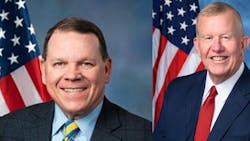House T&I Committee kicks off 119th Congress on Capitol Hill
On Jan. 15, the first activity for the House Committee on Transportation and Infrastructure (T&I) in the 119th Congress happened on Capitol Hill.
To begin the process, Committee Chair Sam Graves (R-MO-6) welcomed 12 new members from the Republican side of the aisle who will serve on the committee in the 119th Congress.
The new members are:
- Rep. Tony Wied (WI-8)
- Rep. Tom Barrett (MI-7)
- Rep. Nick Begich (AK)
- Rep. Rob Bresnahan (PA-8)
- Rep. Jeff Hurd (CO-3)
- Rep. Jefferson Shreve (IN-6)
- Rep. Addison McDowell (NC-6)
- Rep. Dave Taylor (OH-2)
- Rep. Brad Knott (NC-13)
- Rep. Kim King-Hinds (MP)
- Rep. Mike Kennedy (UT-21)
- Rep. Bob Onder (MO-3)
On Jan. 13, Graves named Rep. Mike Ezell (R-MS-4) as the committee’s vice chairman.
“Congressman Ezell is a hard-working and knowledgeable member of the Transportation and Infrastructure Committee, and I am excited to have him serve as the committee’s vice chairman this Congress,” Rep. Graves said. “Since joining transportation and infrastructure, Mike has dedicated himself to learning the various issues we oversee, developing meaningful legislation and contributing to the important work at the committee.”
During his opening remarks, Graves noted the committee is the largest in Congress with a total of 65 members. He introduced alaudid a diverse committee with a bipartisan agenda.
Ranking Member Rep. Rick Larsen (D-WA-2) echoed Graves’ remarks regarding the committee’s bipartisan agenda, emphasizing how transportation and infrastructure has no political party.
“You’ll have the opportunity over the next two years to do real work and go home and talk about it,” Rep. Larsen said.
After Larsen’s remarks, Graves then allowed members to vote on the rules of the 119th Congress, to which he noted are just updating references from the 118th Congress. There was no objection, and the rules were adopted.
Federal funding
The session then continued with the first hearing of the 119th Congress. Larsen cited the Infrastructure Investment and Jobs Act (IIJA), signed by the Biden-Harris Administration in November 2021, has funded more than 85,000 projects to date to improve transit. He highlighted the recent awarding of $1.1 billion in funding by the Federal Transit Administration through the Railroad Crossing Elimination Grant Program to 123 rail projects and said these types of funding opportunities still need to be awarded, as passenger rail is critical to the success of public transit in the U.S. Larsen also noted the infrastructure package for funding expires Sept. 26, 2026, and Congress must act quickly to pass a new package to ensure funding for infrastructure and transit-related projects continue beyond that date.
Mayor Pro Tem Vanessa Fuentes, who represents District 2 on the Austin City Council in Austin, Texas, discussed the importance of the IIJA, as well as federal grant programs such as the Rebuilding American Infrastructure with Sustainability and Equity Grant Program and the Strengthening Mobility and Revolutionizing Transportation Grants Program to continue funding transportation projects.
Rep. Nellie Pou (D-NJ-9) praised the IIJA for providing funding to the Northeast Corridor that is allowing Amtrak to update its trains and address a backlog of maintenance work. She also says the federal funding has allowed the state of New Jersey to purchase zero-emission buses, build the Hudson River Tunnel and continue to advance the Portal North Bridge over the Hackensack River, which she notes is more than halfway complete.
Rep. Jerry Nadler (D-NY-12) questioned Fuentes on the possibility of discontinuing the 80-20 rule to be more flexible towards transit. The rule is a federal funding split for transportation projects, with 80 percent of the funds going to highways and 20 percent to transit. The split has been in place since 1982, and Fuentes said all options need to be on the table.
Fuentes continued, saying she’s always looking for more transit dollars for the Austin region.
“It is imperative we keep having funding come forward, particularly for transit operations,” Rep. Fuentes said. “We know that for our growing cities, this is a way to not only connect our residents, but also ensure we are getting people to where they need to go, including work, the grocery store and school.”
Fuentes notes the Austin Light Rail Project will change the way users use public transportation in the city for generations.
Ridership
Rep. Scott Perry (R-PA-10) notes that while transit funding has improved since the IIJA, it has not solved the problem of transit ridership.
“Federal funding from 1960 to 2019 in inflation-adjusted dollars and operating costs have more than quintupled while ridership has either largely remained unchanged or constant, or since COVID, actually dropped by a quarter,” Rep. Perry said.
When asking New Orleans Gov. Jeff Landry what the solution is, Landry explained it’s the difference between wants and needs.
“Part of the problem we have is the ability to differentiate between the wants and the needs, and you have to fund your needs before you fund your wants. It takes years, sometimes a decade, to get money from the federal government through the procurement process up until the completion of the project,” Rep. Landry said.
Safety and security
The session also saw a big discussion around security for transit systems, with Fuentes leading the discussion of how public transit agencies throughout the U.S. are taking steps to ensure their transit systems are safe. She noted the stigma that public transit is dangerous, and that’s what agencies are trying to combat.
“We are committed at all levels to ensure the safety of our residents,” Rep. Fuentes said. “I believe that through this program [the IIJA), we have the resources and infrastructure needed to ensure the safety of our communities, so they feel safe riding public transit, which is the easiest way to get around.”
About the Author
Brandon Lewis
Associate Editor
Brandon Lewis is a recent graduate of Kent State University with a bachelor’s degree in journalism. Lewis is a former freelance editorial assistant at Vehicle Service Pros in Endeavor Business Media’s Vehicle Repair Group. Lewis brings his knowledge of web managing, copyediting and SEO practices to Mass Transit magazine as an associate editor. He is also a co-host of the Infrastructure Technology Podcast.

